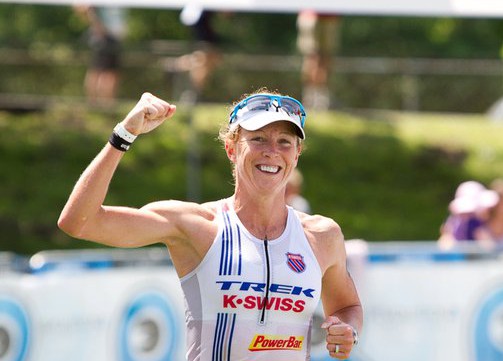On this second round of “The Making of a Pro” I had the privilege to interview England native Julie Dibens. Julie is one of those “super athletes,” as I call them, who raced age group worlds in 1998 at the age of 23, turned pro in 1999 and since has decorated herself with three Xterra World Championships, one 70.3 World Championship, two Olympic appearances and a third place podium spot at Ironman World Championships in Kona. At the age of 40, Julie is still putting in the miles on her Trek bikes for her Leadville 100 debut. Julie did not wake up at age 23 and decide to start her competitive career, it began as a long buildup of many hard working years in athletics to get her to where she is today.
From a young age Julie was always doing something active. Having an older brother, she was encouraged to join in with him on many activities. Her and her brother would throw the ball around for his cricket practice, they would swim together, play tennis together or just go ride bikes around the village. As a club swimmer from a young age, she continued to play sports like tennis, hockey, netball, and rounders (you may have to Google this one, I had to). Once she turned 16, Julie decided that she wanted to take swimming a bit more seriously and focus on swimming competitively year round. Due to her focus, she was recruited by LSU after her final year in school to race on their NCAA swim squad. It was not until after her NCAA career that Julie decided to give triathlon a try. Not a bad decision on her part, I would say.
In my mind, triathlon is not only physical, but it is a huge psychological sport as well. You have to be mentally capable to undergo the stresses that we put on our body, day in and day out, year after year; as well as the sacrifice to your social life. Julie says that her swimming days not only showed her how determined she must be, but it also taught her great self-discipline which is needed to be successful in both swimming and triathlon. Even at a young age, she had to sacrifice a lot of social time with her friends. Between the early mornings and all the weekends spent at the pool, she had very little time to do other fun activities. However, she said that it never seemed as if it were an issue since it was always her choice to be at the pool. Julie says that her willingness to work hard in triathlon comes from the many hours spent staring at that black line at the bottom of the pool. She said that swimming is a hard sport and that 20-25 hours a week training teaches you how to work hard and stay motivated. This has helped her translate well as it is obviously an important aspect needed to be a successful endurance athlete. Julie says that she was driven and determined from an early age. Throughout high school and college she learned how to juggle swimming with academics and still maintain an active social life. This has allowed her to have a much more balanced life as a triathlete. Julie has definitely found what it takes to overcome the mental aspect of triathlon. This is something that many triathletes are still searching to achieve.
Julie, aside from having a stacked group of athletes that she coaches, is still continuing to race. She has her eyes set on The Leadville 100 in August and is getting the full support from Trek whom she has been sponsored by for six years now. Trek has been a huge supporter of Julies since she based herself in the US and stepped up to the 70.3 and Ironman distance. In March of 2009, she was the first female to sign onto the Trek team, spearheaded by Nick Howe. Shortly after her signing, Trek released the Speed Concept and she was fortunate enough to ride it early on in its launching. Not long after, Trek collaborated with KSwiss thus creating the Trek/KSwiss team, which Julie had the opportunity to be a part of. Although Julie has been part of such a great team and has been lucky enough to have such amazing products, she says a sponsorship is so much more than the product or the money you can get. Sponsorships are more about the relationships you create and the connections that you can make with the companies. These are just as valuable of resources, and that is where we will get the loyalty we all want.
Throughout the years, Julie has excelled in many triathlons including Xterras. She says that the laid back and fun vibe have really given her back the stress and political battling she had to deal with, in her seven years competing in ITU races. She says her favorite race would have to be Xterra Worlds in Maui, though she has not raced the new course yet. She also has to give a shout out to Xterra’s Saipan and Guam for they are both beautiful islands and the locals really supported the events. Among her other favorites are St. Croix and Wildflower. However it is a pity that they always fall on the same weekend.
It was great to see how well rounded Julie was in her younger days: immersing herself in many high school sports as well as keeping up with her older brother. These are just a few of the intangibles that have given her the discipline needed to excel as a professional triathlete. To make an athletic career as successful as Julie Dibens has made hers, you need to have the dedication and mind set from an early age. This goes to show that the making of a Pro does not happen overnight.
